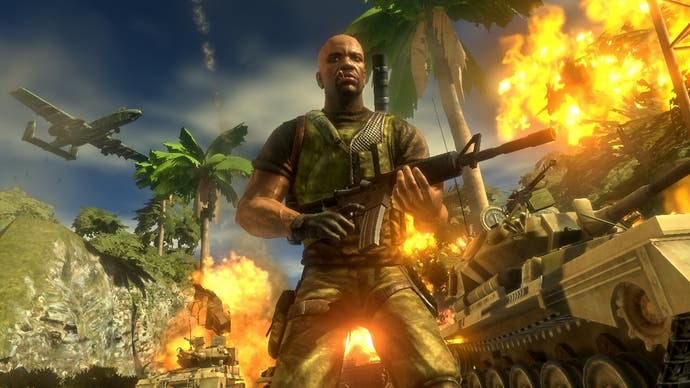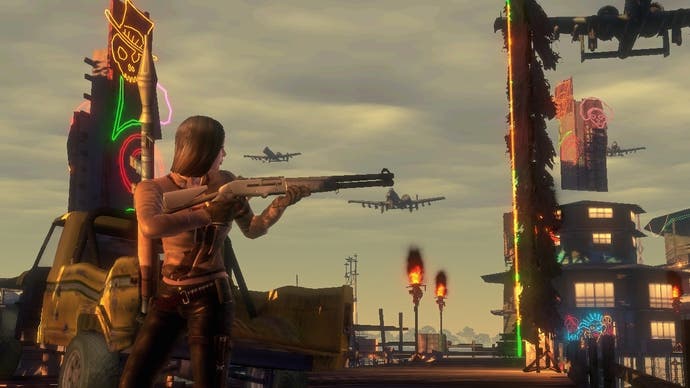Mercenaries 2: World in Flames
Cameron Brown on the delay, GTA, and explosions.
Last July when we went hands-on with Mercenaries 2, the future looked bright for the World in Flames. After that it all went a bit quiet. For ages. Then in January this year, EA came clean about the hold-up, before everyone's favourite silver-haired boardroom fox John Riccitiello confirmed a goal of fiscal 2009. Earlier this month, Mercenaries 2 was given a firm 5th September date on PS3, 360, PC and PS2, meaning that it would be out four months after you-know-what - potentially a deal-breaker for an openworld action game. With all this in mind, we got Pandemic's creative director Cameron Brown on the phone to find out what's been keeping Mercenaries 2, how terrifying it is to go up against Grand Theft Auto IV, and why we should all draw circles around 5th September on our calendars and radio in a holiday.
It wasn't planned in the sense that it was some marketing strategy. It was pretty simple: the game wasn't going to be the quality we wanted to be. It's a huge game and very complicated, and we're on new technology - new platforms - and we're trying to do some pretty interesting stuff. We're doing the campaign co-op in the open world, and it brings a lot of challenges. We just realised we weren't going to be quite ready and we needed more time to polish. It was like, "Oh man, this is going to be uncomfortably tight and we're not going to deliver the game we set out to make on that schedule," so luckily we had the structural backing where we were able to delay it.

Not really. Mercs is a very systemic game where everything is layered on top of each other, so it was more to do with getting it all to work simultaneously. It's a game that encourages the player to be experimental and to approach things in an uncontrollable way, so we had to put a lot of thought into error checking and safety nets and a robust engine. So it wasn't one specific thing, but we were scrambling to finish and didn't have that landing strip we needed to make sure this thing was robust enough to put in the hands of the general population. No one wants to buy a game that looks cool but is busted and won't let you do the things you want to do. This game in particular we really needed to spend a lot of time polishing, and making sure the player can't get us into weird states.
Which game is that? [Laughs]

Not really. GTA is such a phenomenon; so huge that I don't think anyone is really a competitor to GTA in a manner of speaking. I guess we're a competitor in the sense that we're in the openworld genre, but I would actually call it more of a colleague. That's what we aspire to be. And not just in terms of sales - everyone working in the business would love to sell those kind of numbers - but more because we owe a huge debt to GTA. We all found GTA III to be a landmark game in terms of really bringing that open-world design philosophy to a mainstream audience. I still feel a warmth towards GTA III and I still acknowledge the debt we have there.
I think Mercs has gone in a different direction as it has developed and is a very different-feeling game. GTA IV and Mercs 2, when you get down to the nuts and bolts of it, have a very different emphasis. In Mercs 2 you're travelling across an entire country through all these cities and you're really focused on different activities to GTA, where it's much more about that city.
I don't get the sense that someone who's going to buy GTA IV is not going to buy Mercs 2; I don't think it's an either/or decision for anyone. I am really, really fascinated to play the game and see what they've got up their sleeves. Everyone's obviously got high expectations for Rockstar and they're constantly setting the bar in this area. We're feeling like they're expanding the market and redefining what games can be, and they're a very inspiring presence to us. So, not competitors, but we aspire to be colleagues. Let's call it friendly competitors.


